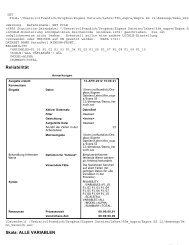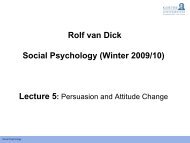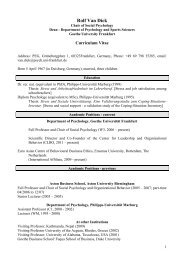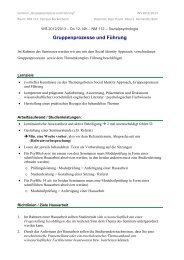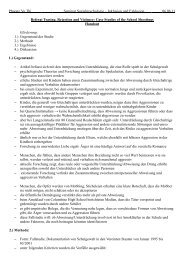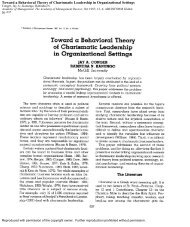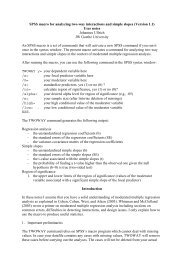Leadership-Interview-Transkript - Sozialpsychologie - Goethe ...
Leadership-Interview-Transkript - Sozialpsychologie - Goethe ...
Leadership-Interview-Transkript - Sozialpsychologie - Goethe ...
Erfolgreiche ePaper selbst erstellen
Machen Sie aus Ihren PDF Publikationen ein blätterbares Flipbook mit unserer einzigartigen Google optimierten e-Paper Software.
think most people learn leadership by looking at models, so, past leaders, current leaders, and<br />
emulating that behavior they see. If you think about the domain of leadership, there’s a<br />
knowledge-base of what to do and how to do, and that’s all learnable, right? I go to school, to<br />
learn all different sorts of kinds of knowledge, and leadership would be no different.<br />
<strong>Leadership</strong> has a set of skills associated with it – influence, for example. Those skills can be<br />
learned. They’re not something you have when you’re young. You get experiences, you test<br />
yourself, you get feedback, you get better at it. So, I think that a lot of the key things that we<br />
look at in terms of leadership are in fact things that you can go out and get experiences.<br />
Rolf van Dick: If it’s so easy, basically, to be a good leader, why does it so often not work?<br />
Why can we see so many managers in organizations, politicians or other people in influential<br />
positions, that obviously are no good? Employees get ill, burn out, etc. Why can’t we just<br />
teach the right people to do the right things and the world would be a better place?<br />
Frederick Morgeson: Yeah, I would say it’s learnable, but I wouldn’t say it’s easy to learn.<br />
And so, these are challenging things to learn. I think oftentimes, you are sort of fighting<br />
against your own in inherent tendencies that you’ve learned from being a child. And so, it’s<br />
learnable, but it takes great effort. Why do we have so many bad leaders? I think, people<br />
haven’t learned the lessons of their own experiences and the experiences of others. And so,<br />
when I think about how one develops these things, if you have to go out and get experiences,<br />
that are the target and what your development needs, you also have to reflect those<br />
experiences and somehow try to extract the lessons from those experiences. And what we<br />
know about most managers, is that they have a lot of experiences, but they don’t take the time<br />
to reflect upon those experiences. And that’s the big problem.<br />
Rolf van Dick: So, it’s maybe a limited time available, but do you also think that probably<br />
people cannot figure it out for themselves, they need a coach or a good mentor or role models<br />
as you say, do you think that helps or is a requirement?<br />
Frederick Morgeson: So I think there’s some sorts of what we call ‘naturals’, right, that are<br />
just really good at it and don’t need a lot of instruction. I think most people do need help. I<br />
think most of the learning that occurs from a leadership standpoint is social learning. So you<br />
learn either by direct instruction or direct feedback, or by simply trying to figure out by<br />
looking at other people, what works and what doesn’t work. And so I think that to the extent<br />
that you can get direct feedback, there’s literature on expert performance and expertise, and a<br />
lot of the rules are as that you have to engage in what they call ‘deliberate practice’. You have<br />
to engage in deliberate practice over an extended period of time. I’ve studied this across a lot<br />
of different group performance domains, and one kind of rule is that you need about 10 years<br />
of deliberate practice to become an expert at something. And I think that would apply for<br />
leadership as well. The thing about deliberate practice is that it’s practice with someone who’s<br />
better at it than you. So you need to get that feedback! So if you don’t systematically go out,<br />
identify mentors, or get coaches, or get some other kind of experiences, this is a big problem.<br />
Rolf van Dick: What about yourself? Did you have a good mentor, or you told me that you<br />
worked as a manager in the family business in the recording industry, did you encounter<br />
people that were really inspiring by the characteristics you described previously?<br />
Frederick Morgeson: Sure, I think about my own sort of style and my own leadership, but I<br />
sort of think that my first leaders were the most influential, this is my mum and dad. They<br />
showed me some key traits that are kind of leadership and character but also just more general<br />
kinds of things that you can leverage as a leader. They demonstrated a strong work ethic. You




